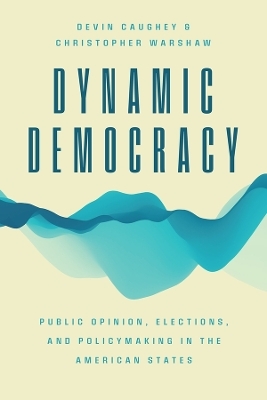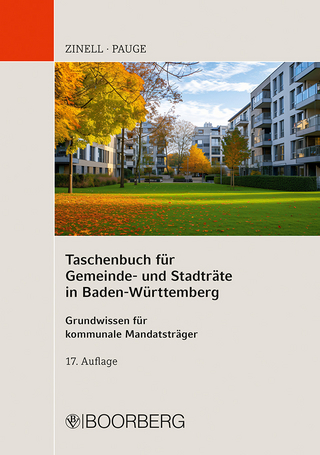
Dynamic Democracy
University of Chicago Press (Verlag)
978-0-226-82222-8 (ISBN)
Scholars of American politics have long been skeptical of ordinary citizens’ capacity to influence, let alone control, their governments. Drawing on over eight decades of state-level evidence on public opinion, elections, and policymaking, Devin Caughey and Christopher Warshaw pose a powerful challenge to this pessimistic view. Their research reveals that although American democracy cannot be taken for granted, state policymaking is far more responsive to citizens’ demands than skeptics claim.
Although governments respond sluggishly in the short term, over the long term, electoral incentives induce state parties and politicians—and ultimately policymaking—to adapt to voters’ preferences. The authors take an empirical and theoretical approach that allows them to assess democracy as a dynamic process. Their evidence across states and over time gives them new leverage to assess relevant outcomes and trends, including the evolution of mass partisanship, mass ideology, and the relationship between partisanship and ideology since the mid-twentieth century; the nationalization of state-level politics; the mechanisms through which voters hold incumbents accountable; the performance of moderate candidates relative to extreme candidates; and the quality of state-level democracy today relative to state-level democracy in other periods.
Devin Caughey is associate professor of political science at the Massachusetts Institute of Technology. He is the author of The Unsolid South. Christopher Warshaw is associate professor of political science at George Washington University.
1. Introduction
1.1 Plan of the Book
2 Measurement: Public Opinion and State Policy
2.1 The Challenge of Measurement
2.2 Data and Measures
2.2.1 Policy and Survey Data
2.2.2 Measures of State Policy and Mass Preferences
2.3 Summary
2.A Technical Appendix on Measurement Models
2.A.1 Issue-Specific Opinion
2.A.2 Ideological Summarization
2.A.3 Commonalities among the Ideological Models
3 Preferences: Partisanship and Ideology in State Publics
3.1 Partisan and Ideological Trends in the States
3.1.1 Partisanship
3.1.2 Ideology
3.1.3 Evolution and Stability
3.2 The Alignment of Ideology and Partisanship
3.3 The Ideological Nationalization of Partisanship
3.4 Summary
4 Policies: The Outputs of State Government
4.1 Trends in State Policy Ideology
4.2 Policy, Preferences, and Party
5 Parties: The Policy Effects of Party Control
5.1 Theoretical Framework
5.2 Policy Effects of Party Control
5.3 Regression Discontinuity Estimates
5.4 Dynamic Panel Estimates
5.5 How Much Does Party Control Matter?
5.6 Summary
6 Elections: Selection, Incentives, and Feedback
6.1 Selection and Incentives
6.2 National Tides and Partisanship
6.3 Partisan Selection
6.4 Candidate Positioning and Electoral Success
6.5 Collective Accountability and Negative Feedback
6.5.1 Electoral Feedback
6.6 Summary
7 Responsiveness: The Public’s Influence on State Policies
7.1 Operationalizing Responsiveness
7.2 Position Responsiveness
7.3 Policy Responsiveness
7.3.1 Heterogeneity: Era and Region
7.3.2 Mechanisms: Turnover versus Adaptation
7.3.3 Cumulative Responsiveness
7.4 Summary
8 Proximity: The Match between Preferences and Policies
8.1 Data on Policy-Specific Representation
8.2 Policy Bias
8.3 Policy Proximity
8.3.1 The Dynamics of Policy Proximity
8.4 Summary
9 Deficits: Gaps in American Democracy
9.1 The Jim Crow South
9.1.1 Racial Disparities in Representation
9.2 Legislative Malapportionment
9.3 Partisan Gerrymandering
9.4 Summary
10 Reforms: Improving American Democracy
10.1 Background on Institutional Reforms
10.1.1 Citizen Governance
10.1.2 Voting
10.1.3 Money in Politics
10.1.4 Labor Unions
10.2 The Effects of Institutional Reforms
10.3 Summary
11 Conclusion
11.1 Normative Implications
11.2 Prospects for Reform
11.3 Whither State Politics?
11.4 Implications for Future Research
Acknowledgments
Notes
Bibliography
Index
| Erscheinungsdatum | 07.11.2022 |
|---|---|
| Reihe/Serie | Chicago Studies in American Politics |
| Zusatzinfo | 91 line drawings, 7 tables |
| Sprache | englisch |
| Maße | 152 x 229 mm |
| Gewicht | 313 g |
| Themenwelt | Sozialwissenschaften ► Politik / Verwaltung ► Staat / Verwaltung |
| ISBN-10 | 0-226-82222-2 / 0226822222 |
| ISBN-13 | 978-0-226-82222-8 / 9780226822228 |
| Zustand | Neuware |
| Haben Sie eine Frage zum Produkt? |
aus dem Bereich


